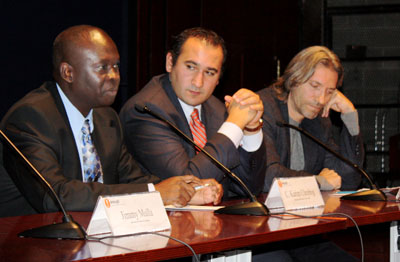
Last week we had the opportunity to gather a few hundred people at the U.S. Capitol to watch "War Child," a film about former child soldier Emmanuel Jal from southern Sudan, which sparked an engaging discussion about the danger the region faces if there isn’t a major diplomatic intervention to prevent a return to full-scale war.
Jimmy Mulla from Voices of Sudan joined me on the panel after the film and talked about the last war in the South – the one in which Emmanuel fought – a conflict which cost over two million lives. He worries that if diplomatic efforts aren’t enhanced, his homeland could return to the kinds of horrors in the 1980s and 1990s that resulted in one of the deadliest wars in the last half century. Karim Chrobog, the director of the film, said that traveling to the region to gather footage for “War Child” reminded him that child soldiering is a persistent problem. Emmanuel’s story is an exception; many young boys remain in very precarious situations, fighting grown-ups’ wars. I focused on the patterns of conflict that are being repeated again in the South, where militia attacks are beginning to escalate, slowly revealing a hidden hand in Khartoum that is promoting violence and division in the South in order to undermine the self-determination referendum scheduled for 2011.
We talked about how concerted, high-level international diplomatic pressure on the ruling National Congress Party in Khartoum is the most important ingredient to peacemaking at this juncture. Armed with his new peace prize from the Nobel committee, President Obama must personally insert himself in the storm brewing in Sudan and help prevent a disastrous shipwreck.
Activists should write letters to their members of Congress and tell them to contact the White House and send a message to get tough on the Sudanese regime in order to advance peace in Darfur and southern Sudan.

